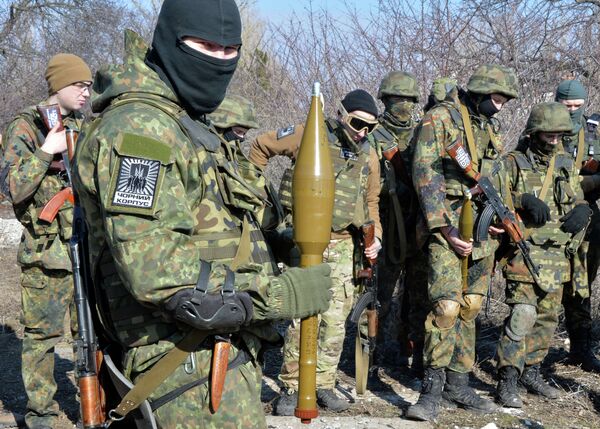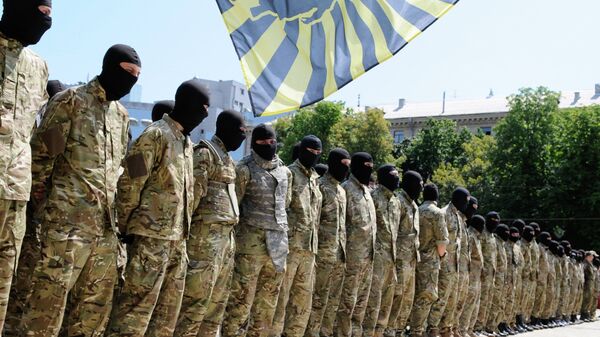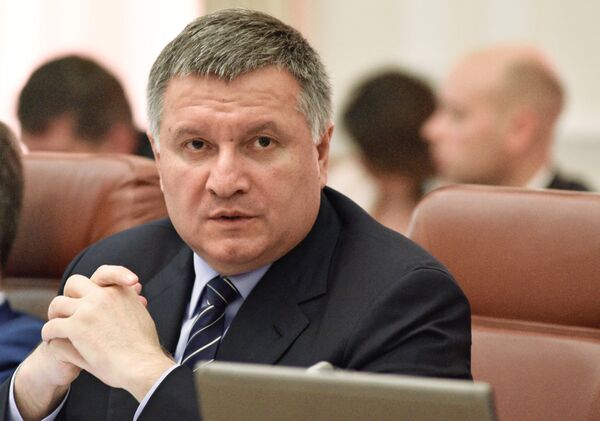Curiously, it took a mainstream British broadcaster quite a while to finally acknowledge the seriousness and the extent of the problem brewing in Ukraine.
The Ukraine: On patrol with the far-right National Militia report by the BBC Newsnight program on April 3, 2018 has highlighted the controversy surrounding the Ukrainian far-right nationalist group and its ties to illegal activity, top officials in Kiev and violent crimes.
The video report shows images of the Maidan square in Kiev in 2014, describing the moment when "hundreds of thousands people rallied and ultimately forced out an unpopular president."
"Russia branded it a coup, orchestrated by neo-Nazis and fascists. It wasn't true then but 4 years on Ukraine's far-right is on the march and there appears little appetite for stopping it," the report adds.
READ MORE: Ukrainian Nationalists' Long Ascent to New Heights of Power
BBC's video report then goes into showing footage of its reporter interviewing members of the National Militia who claim they are working with the Ukrainian police to "spot crime and react to it," as well as "control the situation in the streets in general."
Interestingly, while accompanied by the journalist, members of the group seem to act "pretty tame." A few moments later CCTV footage is shown of National Militia members raiding various locations, shops and gambling places — setting them on fire and destroying property.
The reporter continues to describe how National Militia fought with the Ukrainian police (as opposed to supporting it), attempted to influence a local judge, and affect the voting in the city council of Cherkasy in Ukraine.
The connection is then established by the BBC report between the group and Ukraine's infamous Azov volunteer neo-Nazi battalion, known for its extremist nationalist views, whose symbol closely resembles the Nazi insignia.
Rewind back a few years and it was Russia who has numerously pointed out to the international community that radical nationalists — insert the likes of Azov, the Organization of Ukrainian Nationalists (OUN) and the Right Sector — were used for political and military purposes in Ukraine. The ultranationalist volunteer battalions were also accused of committing war crimes against the civilian population in the eastern regions of Ukraine.

READ MORE: Still Do Not See Any Nazi? Ukrainian Nationalists Stage Massive March in Kiev
BBC highlighting in 2018 the links of the Azov group to Ukraine's interior minister Arsen Avakov is just short of very late, considering that in 2014 the Russian Investigative Committee had identified commanders of the Azov, Aidar, Dnipro and Donbass battalions as suspects in attacks on civilian targets in south-eastern Ukraine.
A month earlier Russia had issued arrest warrants for Avakov on charges of organizing murders and abductions, using banned means and methods of warfare, and preventing legal journalistic activities.
Why are the western media catching up just now? Is it part of the "it wasn't true then but we can definitely see it now" approach?
Perhaps, in a few years the British public will have the pleasure of watching another report by Western mainstream media "discovering," for example, that Russia's arguments over the Skripal poisoning case that weren't "true then," actually make perfect sense now.
By Sputnik Editorial Team




